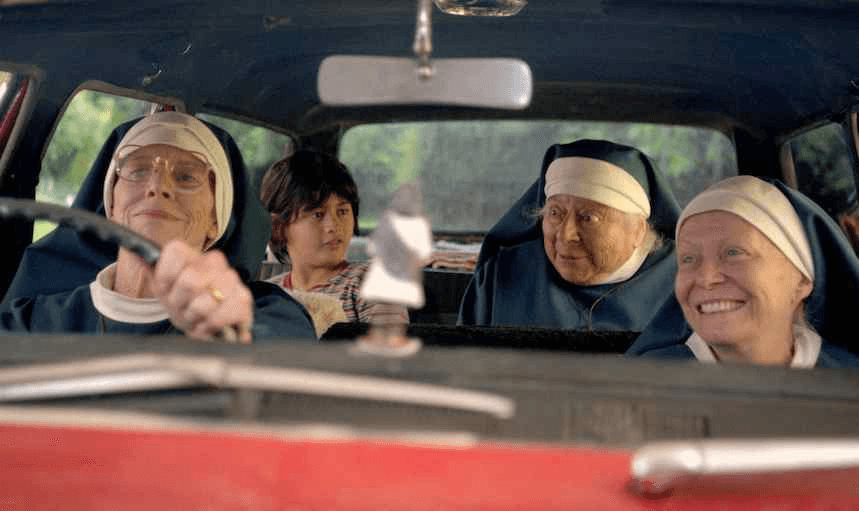The acclaimed New Zealand drama has just premiered on TV in the United Kingdom, and the five-star reviews are already flowing in.
Six months after it was called a “blistering” “tour de force” by Australian critics, and nearly a year since The Spinoff declared it the best drama New Zealand has ever made, After the Party has premiered today in the United Kingdom to equally rave reviews. The “gritty, wrenching and highly confronting” drama stars Robyn Malcolm as Wellington teacher Penny, who accuses her husband Phil (Scottish actor Peter Mullan) of a sex crime at a boozy house party.
What happens next is a six-part white knuckle ride through one deeply fallible yet doggedly determined woman’s quest to unearth the truth, while everyone else desperately tries to move on.
So how have critics in the United Kingdom responded to our “dark, tense and highly provocative drama” after it aired on Channel 4 just a few hours ago? And did they also enjoy watching Phil Spencer’s New Zealand Best Homes, which followed it in the programming? We trawled the reviewsphere and found nothing but rave reviews.
The Guardian UK: ‘Hands down the best acting on TV all year’ (⭐⭐⭐⭐⭐)
Lucy Mangan’s five-star review for The Guardian opens with glowing praise for Robyn Malcolm (“It’s a bravura performance from the very beginning”), continues with glowing praise for Robyn Malcolm (“surely the performance of the year”), and ends with glowing praise for Robyn Malcolm (“What a role. What an actor. What a performance”). And who can really blame her?
Drawing comparisons with Happy Valley’s Catherine Cawood and Mare of Easttown Mare Sheehan, Mangan said that Penny is a type of middle-aged female character “who has seen too much of life not to know precisely how awful it can be.” Praising Malcolm, “whom you believe utterly”, Mangan describes “a portrait of a woman whose inability to compromise, to sigh and turn away from perceived danger or injustice, is both a flaw and heroic.”
Beyond the complex middle-aged protagonists, Mangan also made another parallel with the “textured layering” and “immersive quality” of award-winning dramas Mare and Happy Valley: “absolute authenticity through and through.” The execution of the After the Party is “brilliant”, the supporting characters “uniformly well-rounded” but “Malcolm is the centrepiece.” Perhaps the only negative here in this total rave review is that she called Wellington a “small town”. Boo!
The Telegraph: ‘Robyn Malcolm deserves a Bafta’ (⭐⭐⭐⭐⭐)
Writing for The Telegraph, Anita Singh was also shouting from the rooftops about Malcolm’s performance, even suggesting Bafta buzz. “The best TV performance of the year is by an actor most British viewers won’t recognise, in a New Zealand production that most won’t see,” she writes. “The actor is Robyn Malcolm in After the Party; if Kate Winslet or Sarah Lancashire played this role even half as well, they’d have the Baftas all sewn up.”
While Singh admits she had been reluctant to watch the series due to the subject matter – “nobody’s idea of a good time” – she soon came round. “Penny is the type to come straight out and say what she thinks, unafraid of the repercussions. She’s earthy, unembarrassable and gloriously no-nonsense,” she writes. Unlike The Guardian, she resists the urge to call our capital city a small town: “the setting, a very windy Wellington, feels fresh to British eyes.”
Another five star review, centered around a tour de force performance: “Penny feels messy and real, and Malcolm’s phenomenal performance will keep you hooked.”
iNews: ‘The best Kiwi drama since Top of the Lake’ (⭐⭐⭐⭐⭐)
Another five-starrer, this time comparing After the Party with Top of the Lake, another world class drama export. “Both are twisty and atmospheric, both have plots spun around ugly pasts rearing up in the present – and both star actors Robyn Malcolm and Peter Mullan,” Rachel Sigee writes. But After the Party… confidently establishes itself as its own entity: a blistering and intelligent drama of tangled morals, anchored by a remarkable central performance.”
Great! What could possibly go wrong here! “Marshall is immediately captivating as Penny,” Sigee continued, in a bigger national insult than calling Wellington a small town. “A woman of an age that television tends only to be interested in if they are extremely wealthy.” Even with the name slip up, iNews stuck the landing with this: “As challenging as it is compelling, this miniseries is a modern masterpiece.” Marshall, come and get your Bafta now.
The Times: ‘Beautifully controlled’ (⭐⭐⭐⭐)
Okay take a deep breath and put down your pitchforks everyone, but The Times only dished out a measly four stars. “After the Party has been billed by some as the best TV drama of the year,” Carol Midgley begins. “That might be overstating things a shade, but it is certainly excellent.”
Singling out the opening sequence in particular, where Penny delivers a frank monologue about pornography to a class of teenage boys, Midgley calls it “the best opening six minutes to a drama series I have seen in some time” thanks to both a “scorching performance” and “great dialogue”. More praise for Malcolm’s performance: “It is so nutty and layered, sometimes making Penny likeable, sometimes not: this is a performance so prevailing and so lacking in vanity as to compare to Kate Winslet’s in Mare of Easttown.”
Midgley also heaped praise on the “beautifully controlled” storytelling, with the viewer only piecing the offending incident together through flashbacks. “Normally I hate flashbacks but these are well done,” she adds. A tougher customer who, although she found the final twist “a rug-puller that is not nuanced” still says “this is a series worth every hour of your time.”



